Independent heating of a private house: features and
Independent heating systems of a private house allow you to organize the heating of objects not connected to the centralized network of coolant supply. We want to consider the features of such systems, as well as help you choose the right solution for your conditions from a variety of possible options.
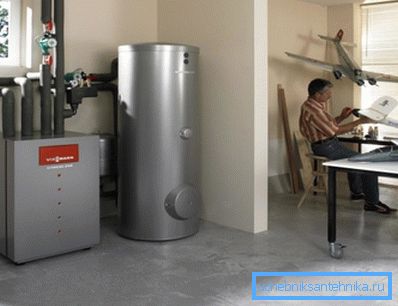
Autonomous heating systems
General information
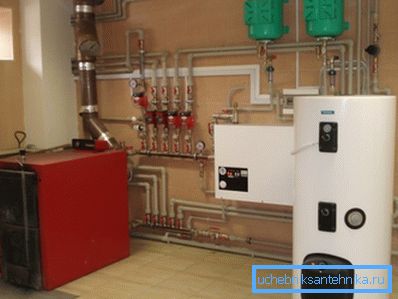
With the growth of the purchasing power of the Russians, their requirements for comfort conditions increased not only in city apartments, but also in country houses and country cottages. Given the Russian climate, the view that heating is the main condition for comfort will not be an exaggeration.

Centralized heating is a purely urban convenience, which is rare in small towns, not to mention the dacha cooperatives and cottage townships. Nevertheless, many gardeners practice winter visits to the site, and some even live there permanently.

Note! To ensure the possibility of operating a private house during the cold season, it is necessary to build an autonomous heating system. However, this phrase combines a large mass of possible options and designs, and the choice of a specific solution often causes problems.
Criterias of choice

In order to facilitate the task of choosing a system for you, we propose to consider the main criteria, with the help of which you can unmistakably find a suitable option. We will derive these criteria from the basic requirements and characteristics that must be met by high-quality and efficient heating of the house.

So, let us list the main characteristics on the basis of which it is possible to draw a conclusion about the effectiveness and relevance of a particular structure:
- The type of fuel on which the boiler will operate. Modern systems can use natural and liquefied gas, solid fuels, diesel or other liquid hydrocarbons, electricity and alternative sources. This is the most important characteristic, since a lot of parameters will depend on the selected fuel;
- Cost of equipment and consumables. Different systems can vary greatly in configuration and set of equipment used, type of pipes and heating devices. At the same time, the principle “expensive means good” does not always work;
- Installation complexity. Far from any heating structure can be built with your own hands, so when choosing a system, you should take into account such factors as the complexity and cost of equipment installation;
- Features of system management and maintenance. Many modern companies offer comprehensive solutions based on a fully automated principle of operation, however, such solutions need some care. Less advanced traditional systems require constant monitoring and maintenance by the operator;
- Expected heating mode. It is important to determine in advance whether your system will constantly or occasionally work, since some features of its organization depend on it.
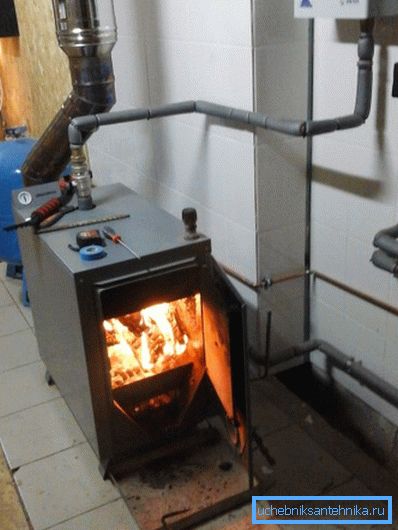
Note! Obviously, any buyer will seek to find an inexpensive, but high-quality option. However, it should be remembered that the main expenses will go not to purchase equipment, but to pay for energy carriers, therefore, their choice should be taken very carefully.
Fuel types and system differences
Natural gas

The richness of the bowels of our country has made natural gas the cheapest source of heat. Moreover, the fuel enters the highway directly to our homes, which makes its use not only profitable, but also convenient.
With the help of gas, it is possible to produce heat carrier heating in water heating systems of any configuration: radiator, floor, etc.
The heart of the water system is the heating boiler, so we consider its main features:
- Uses the cheapest form of fuel - natural gas;
- The operation of the boiler does not cause problems: adjustment and control of the operation takes place automatically, it is not necessary to load the fuel manually, the device does not produce soot and ash;
- There is no need to deliver energy to the site independently;
- A very wide range of different equipment allows you to choose the most suitable option for your needs;
- High efficiency of the units determined their economic efficiency;
- The cost of a gas boiler is relatively low.
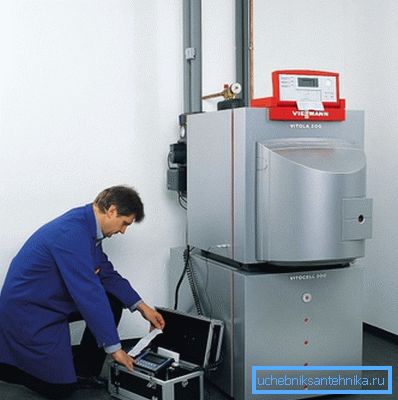
Note! If there is a gas main in your house, there is no need to read further, it is better to focus on the choice of gas equipment using other materials from our site. Gas heating is cheap, convenient and efficient, in this respect gas is the most preferred option.
Solid fuel
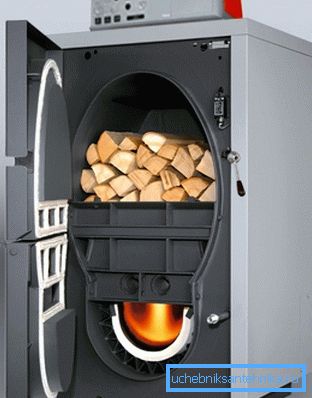
It so happened that our country is rich not only in mineral resources, but also in natural resources. A huge amount of wood has made firewood and other solid fuels an inexpensive type of energy carrier.
For solid fuels include:
- Wood;
- Coal;
- Coke;
- Peat;
- Waste wood industry;
- Pellets, fuel briquettes, etc .;
- Various dead wood, garbage, straw, combustible residues of biomass of different origin.

Solid fuel heating ranks second in low prices after the main gas. It also uses water circuits coolant circulation and domestic heating boilers.
Consider their features:
- The simple and reliable design allows to operate the equipment for a long time;
- Cheap and affordable fuel is used;
- The operation of the boiler requires the direct participation of the stoker, as the automatic feeding of logs to the furnace has not yet been invented. There are models with auger pellet feed, but their price is very high;
- A quality chimney and comprehensive fire safety measures are required;
- Care and maintenance of the unit requires some effort: cleaning the ashes, cleaning the flue ducts from soot and condensate, switching operating modes with the help of dampers and valves;
- A dry, closed place for storing firewood is necessary, and the delivery of this firewood to the site is also required.
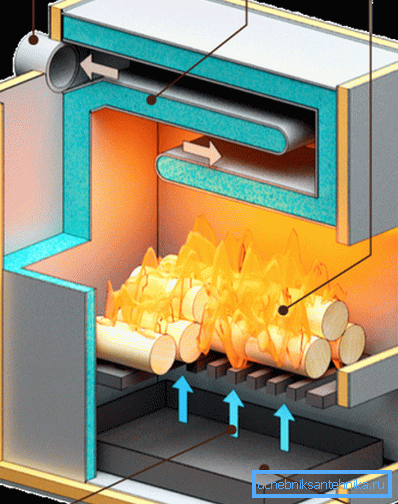
Note! The main disadvantage of wood heating boilers is the short burning time of one fueling - 3 - 4 hours. Modern pyrolysis units are deprived of this disadvantage, it is also possible to use additional energy sources - electric heaters, which turn on automatically when the temperature in the circuit drops.
Electricity
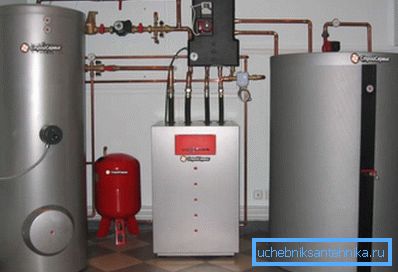
If the gas pipeline in your area is missing, and getting firewood is problematic, then you still have the option of electrical energy. Due to the complete electrification problems with connection to the network usually does not occur.
Everything is simple here: electrical devices are among the most technologically advanced, automated and efficient devices, but the cost of electricity makes their use very economically unprofitable.
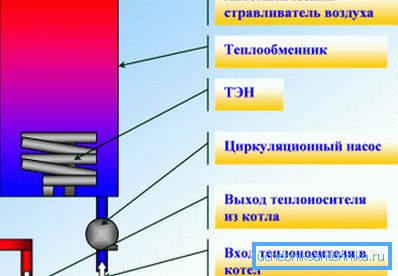
Among the advantages are the complete autonomy of work, the absence of emissions and waste, safety, the absence of a chimney, compactness, quiet operation, centralized power supply via wires, and comparative cheapness of equipment.
On the other hand, the power of the device is limited by the network's capabilities, and we all know what quality is typical for country power grids. Powerful units require connection to a three-phase network of 380 V, which requires coordination with regulatory authorities.
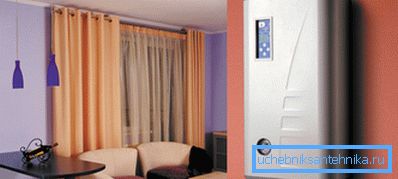
However, the main drawback of electric boilers is the prohibitively high cost of heating. For example, let's compare prices for the production of one kilowatt-hour of thermal energy:
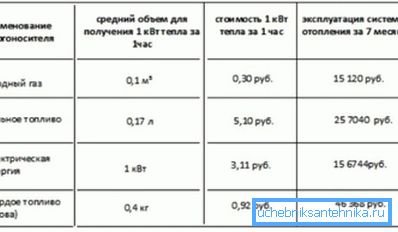
Note! As can be seen from the table, only diesel fuel is more expensive than electricity. Therefore, it is worthwhile to use electric heating systems only in the absence of alternatives or in case your income allows you to pay convenience with multiple overpayments.
Conclusion
Despite the fact that there is no clear instruction on the choice of a heating system, we have derived a number of criteria with which you can easily and accurately select one or another solution. Our video will help you to more thoroughly understand this issue.